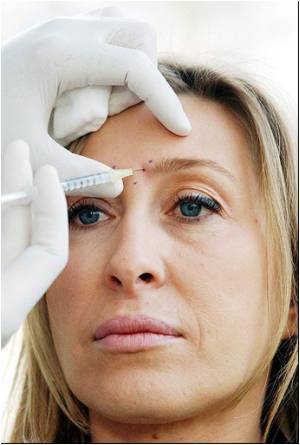Botox could be effective against thoracic outlet syndrome (TOS), a painful and debilitating nerve compression disorder.

Though the study, published in the April issue of the journal Pain Medicine, was small, researchers say it suggests Botox is a safe, noninvasive alternative to the syndrome’s treatment of last resort: surgery to remove the first rib and sever one of the muscles in the neck.
“There haven’t been many alternatives to the use of surgery to treat this syndrome,” says Paul J. Christo, M.D., M.B.A., an assistant professor of anesthesiology and critical care medicine at the Johns Hopkins University School of Medicine and the study’s lead author. “Botox seems to be an effective treatment that avoids surgery’s obvious drawbacks, such as its invasive nature and long recovery time.”
Christo says his latest work significantly improves on previous studies in which TOS sufferers received several Botox injections or injections were made more blindly, without the aid of a CT scan.
TOS is caused by a compression of nerves in the lower neck, which occurs when there is not enough room in the cavity between the base of the neck and the armpit (the thoracic outlet) for nerve impulses to freely pass through. Symptoms often develop in the neck or head and tend to shoot down the arm, causing often excruciating pain, numbness and/or weakness in the limb and extremities. The condition is typically caused by the trauma of a motor vehicle accident, but can also be caused by sitting in the wrong position at a computer for long periods of time, by weightlifting or by an extra rib that is sometimes present in the neck. Treatments include physical therapy, anti-inflammatory medications or surgery.
Christo and his colleagues evaluated 27 patients who were candidates for surgery to treat their TOS and for whom physical therapy and anti-inflammatory medications failed to help. Each was given a 20-unit injection of Botox, a brand-name drug that contains botulinum toxin, made from the same bacterium that causes botulism, a paralyzing and life-threatening form of food poisoning. Christo used a CT scanner to guide the placement of the needle in the patient’s anterior scalene muscle in the neck. Each session lasted around one minute, requiring minimal radiation, he says.
“This modest amount of pain reduction can have a significant impact on a patient’s life,” says Christo, a pain medicine specialist. “For many, it allows them to do what they couldn’t do before — brush their hair, brush their teeth, hold their child.”
The effects of the drug begin to wear off in a few months, as they do when Botox is injected into facial wrinkles. Christo says patients should be able to receive repeated injections of Botox into the muscle over time, though some could develop antibodies to the compound with excessive use, which would mean the toxin would no longer block pain.
In the study, 48 percent of patients went on to have surgery. Christo says that is because many of those who agreed to participate in the Botox study did so only as a bridge of pain relief before they could get a date in the operating room. Others tried the Botox technique in the hope that they could avoid having surgery, he says. Not all patients are candidates for Botox.
Christo says he would like to do further research into the use of Botox for TOS, following up longer term with patients who are injected with the toxin.
Source-
 MEDINDIA
MEDINDIA



 Email
Email








